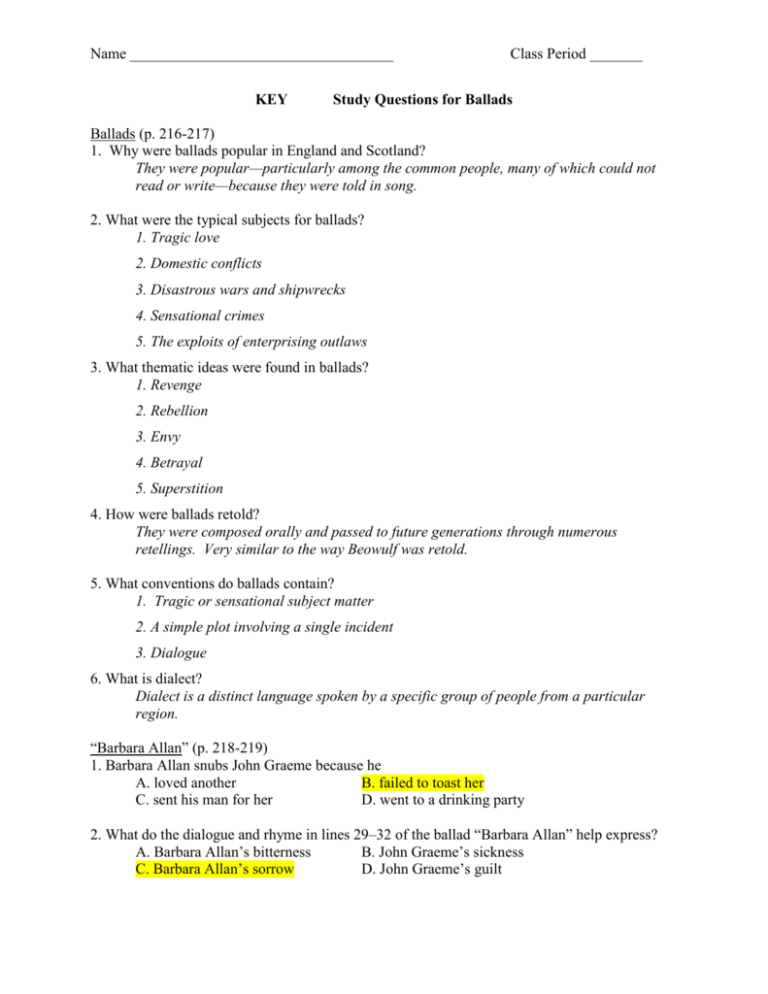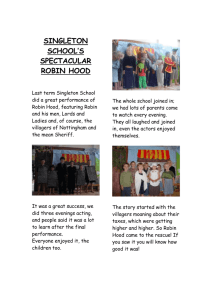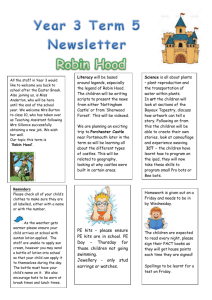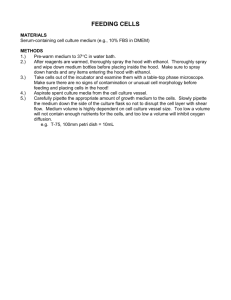Study Questions for Ballads
advertisement

Name ___________________________________ KEY Class Period _______ Study Questions for Ballads Ballads (p. 216-217) 1. Why were ballads popular in England and Scotland? They were popular—particularly among the common people, many of which could not read or write—because they were told in song. 2. What were the typical subjects for ballads? 1. Tragic love 2. Domestic conflicts 3. Disastrous wars and shipwrecks 4. Sensational crimes 5. The exploits of enterprising outlaws 3. What thematic ideas were found in ballads? 1. Revenge 2. Rebellion 3. Envy 4. Betrayal 5. Superstition 4. How were ballads retold? They were composed orally and passed to future generations through numerous retellings. Very similar to the way Beowulf was retold. 5. What conventions do ballads contain? 1. Tragic or sensational subject matter 2. A simple plot involving a single incident 3. Dialogue 6. What is dialect? Dialect is a distinct language spoken by a specific group of people from a particular region. “Barbara Allan” (p. 218-219) 1. Barbara Allan snubs John Graeme because he A. loved another B. failed to toast her C. sent his man for her D. went to a drinking party 2. What do the dialogue and rhyme in lines 29–32 of the ballad “Barbara Allan” help express? A. Barbara Allan’s bitterness B. John Graeme’s sickness C. Barbara Allan’s sorrow D. John Graeme’s guilt Name ___________________________________ Class Period _______ 3. What is Barbara Allan’s overall true feeling for John Graeme? A. indifference B. anger C. pity D. love 4. In “Barbara Allan,” John Graeme falls ill because A. Barbara Allan spurned him B. he attended a drinking party C. Barbara Allan refused to come to him D. his man reached Barbara Allan too late 5. The dialogue in lines 13–16 of the ballad “Barbara Allan” lets you know that medieval society A. thought all women should find love B. thought women were crueler than men C. believed that men often died from love D. placed high value on the power of love 6. What does Barbara Allan do when she last sees John Graeme? A. feels sorrow B. believes he is indifferent C. wishes he had never lived D. wants to find happiness with him “Robin Hood and the Three Squires” (p. 220-221) 1. The dialogue in lines 13–20 of the ballad “Robin Hood and the Three Squires” lets you know that in medieval society A. these offenses were considered very serious B. crime was an unimportant issue in England C. only these crimes were worthy of punishment D. everyone knew about others’ crimes 2. In “Robin Hood and the Three Squires,” Robin Hood’s success depends mainly on A. the three squires B. the old woman C. his disguise D. his bags 3. What is the outcome of “Robin Hood and the Three Squires”? A. The sheriff captures Robin Hood, but the old man punishes the sheriff and his men. B. Robin Hood frees his men and then runs away from the sheriff. C. The sheriff is hanged, and Robin Hood helps the three squires escape. D. Robin Hood pays an intimidating visit to the sheriff. 4. In “Robin Hood and the Three Squires,” Robin Hood thanks the old woman for A. traveling with him on the road to Nottingham B. delivering such important news C. changing clothes with him D. feeding him some supper 5. Reread line 60 of “Robin Hood and the Three Squires.” Why does Robin Hood say this? A. He smells bread and wine on the clothes. B. The clothes are too small for Robin Hood. C. He had to give the man twenty gold pieces. D. The old man’s clothes are old and patched. 6. In “Robin Hood and the Three Squires,” Robin Hood views the sheriff as A. a man who is only doing his job B. the dutiful servant of the king C. someone he both curses and despises D. a ready plaything for his attendants Name ___________________________________ Class Period _______ “Get Up and Bar the Door” (p. 224-225) 1. What does the couple agree on in “Get Up and Bar the Door”? A. using the water from the pudding broth B. celebrating St. Martin’s Day C. the danger they must avoid D. the rule for who should bar the door 2. Paraphrase lines 29–36 of “Get Up and Bar the Door.” The main effect of the ballad’s dialogue and rhyme is to A. match violence with musical qualities B. create a comic effect from violent events C. characterize the intruders as typical gentlemen D. recreate an authentic idea of the time and place 3. Why does the woman seem happy at the end of “Get Up and Bar the Door”? A. Her husband must get up and secure the door. B. The gentlemen have left her home untouched. C. Her husband has defended her honor and safety. D. She has forced the gentlemen to leave the house. 4. What is the “paction” in line 13 of “Get Up and Bar the Door”? A. If robbers appear, it will be too dangerous to get up and bar the door. B. It is firm and sure that neither the husband nor the wife will get up and bar the door. C. The first person who speaks is the one who must get up and bar the door. D. Only when the puddings are done will the wife get up and bar the door. 5. Paraphrase lines 21–24 of “Get Up and Bar the Door.” Which statement best describes the action in the ballad? A. The two gentlemen know what house they have reached, but they will refuse to bar the door. B. Outside, the two men wonder what lies within; inside, the people hear this but refuse to speak. C. It is unimportant whether it is a poor house or a rich one, for the people refuse to bar the door. D. The men are speaking to the two people who refuse to hear them. 6. Why is the husband in “Get Up and Bar the Door” forced to secure the door? A. He yells at the gentlemen in the house. B. His wife tells him to secure it. C. The gentlemen are trying to get in the house. D. He feels a strong draft under the door.







